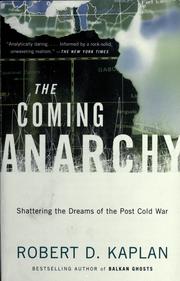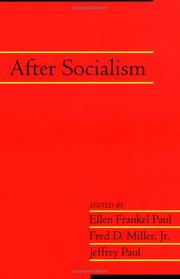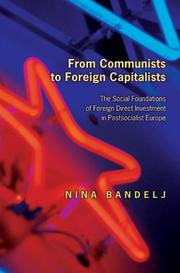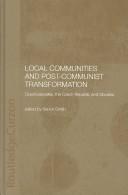| Listing 1 - 10 of 389 | << page >> |
Sort by
|
Book
ISBN: 3869280166 Year: 2009 Publisher: Croatia : Heinrich-Böll-Stiftung e.V.,
Abstract | Keywords | Export | Availability | Bookmark
 Loading...
Loading...Choose an application
- Reference Manager
- EndNote
- RefWorks (Direct export to RefWorks)
This study is primarily based on experiences during activist commitments and in my working with international foundations. The encouragement to undertake the study came from Dr. Azra Džajic´-Weber, the director of the Regional Office of the Heinrich Böll Foundation in Sarajevo from 1998 to 2007. The work was originally conceived as a collection and interpretation of the experiences of a broad variety of civic actors in Bosnia-Herzegovina, Croatia, and Serbia. In the early stage, however, it became obvious that it was necessary first to examine, and even “deconstruct,” the fundamental concepts that have framed the original approach. Rather than assuming that building democracy and rule of law was already underway – as well as the development of civil society – it turned out that many problems lay in those very assumptions. The most important is the problem of overlooking the fact that in the postcommunist transformation, society itself had yet to be established. // Therefore, the work in its final outcome is mostly dedicated to the very meaning of the basic determinants of the postcommunist transformation, in order to fathom the civic actors’ place within the newly defined framework. They are not referred to as a “civil society” but as civil actors, because it is they who, together with other factors, develop a society as a complex of autonomous relations and transactions, as well as a field for civic commitment.
Post-communism. --- Postcommunism --- World politics --- Communism

ISBN: 9780375707599 037570759X Year: 2001 Publisher: New York, N.Y. Vintage Books, a division of Random House, Inc.
Abstract | Keywords | Export | Availability | Bookmark
 Loading...
Loading...Choose an application
- Reference Manager
- EndNote
- RefWorks (Direct export to RefWorks)
Polemology --- World politics --- Post-communism --- Postcommunism --- Communism

ISBN: 0511550103 0521534984 Year: 2003 Publisher: Cambridge : Cambridge University Press,
Abstract | Keywords | Export | Availability | Bookmark
 Loading...
Loading...Choose an application
- Reference Manager
- EndNote
- RefWorks (Direct export to RefWorks)
In this collection, twelve philosophers, historians, and political philosophers-scholars with a diverse set of disciplinary and political leanings-assess aspects of socialism in light of its recent reversals. Some of the essays consider what made the socialist project seem compelling to its advocates, examining the moral and political values that made socialism appealing to intellectuals. Others evaluate whether there are aspects of socialism that ought to be preserved, such as its quest for equality and community. Some essays examine whether free-market systems need to be further modified in response to ongoing socialist critiques. Several others argue for the continuing validity of socialism in its social democratic incarnation, suggesting ways in which socialism may still have a productive future. Still others condemn the socialist project as inherently misguided in theory, while also portraying 'really existing socialism' as cataclysmic in practice.
Post-communism. --- Postcommunism --- World politics --- Communism --- Arts and Humanities --- Philosophy
Book
ISBN: 9639776858 9786613256744 9639776912 1283256746 9789639776913 9789639776852 Year: 2022 Publisher: Budapest New York
Abstract | Keywords | Export | Availability | Bookmark
 Loading...
Loading...Choose an application
- Reference Manager
- EndNote
- RefWorks (Direct export to RefWorks)
Discusses the policies, practices and outcomes of privatization in six transition economies: the Czech Republic, Hungary, Poland, Russia, Slovenia and Ukraine, paying particular attention to cross-country differences and to interrelations between the processes of privatisation and the political transition from communism to a new system.The analysis is restricted to the privatisation in those fields where its methods have been strongly different from privatisations in advanced market economies and where differences of privatisation principles and techniques among our six countries were also rather various. This is basically the privatisation of middle-sized and large enterprises, not including banks, non-bank financial companies, natural monopolies and agricultural entities.
Privatization --- Post-communism. --- Postcommunism --- World politics --- Communism --- Post-communism --- E-books --- East-central Europe, Political economy, Postcommunism, Privatization, Transition economies.
Book
ISBN: 9633863716 9633863708 9789633863701 Year: 2020 Publisher: [s.l.] : Central European University Press,
Abstract | Keywords | Export | Availability | Bookmark
 Loading...
Loading...Choose an application
- Reference Manager
- EndNote
- RefWorks (Direct export to RefWorks)
"This book offers a single, coherent framework of the political, economic, and social phenomena that characterize post-communist regimes. Focusing on Central Europe, the post-Soviet countries and China, the study provides concepts and theories to analyze the actors, institutions, and dynamics of post-communist democracies, autocracies, and dictatorships. The work explores the structural foundations of post-communist regime development; the types of state, with an emphasis on informality and patronalism; the types of actors in the political, economic, and communal spheres; the ways autocrats neutralize the institutions of public deliberation (media, elections, etc.); the color revolutions of civil resistance (as in Georgia and in Ukraine) and the defensive mechanisms of democracy and autocracy; the evolution of corruption and the workings of "relational economy"; an analysis of China as "market-exploiting dictatorship"; the sociology of "clientage society"; the instrumental use of ideology, with an emphasis on populism; and a six-regime framework for modeling regime trajectories. Written in textbook style, the book is suitable for both beginners who wish to understand the logic of post-communism and scholars who are interested in original contributions to comparative regime theory. The book is equipped with QR codes that link to a website, which contains interactive, 3D supplementary material for teaching"--

ISBN: 1283290995 9786613290991 1400841259 0691129126 9780691129129 9781400841257 9781283290999 6613290998 Year: 2008 Publisher: Princeton : Princeton University Press,
Abstract | Keywords | Export | Availability | Bookmark
 Loading...
Loading...Choose an application
- Reference Manager
- EndNote
- RefWorks (Direct export to RefWorks)
From Communists to Foreign Capitalists explores the intersections of two momentous changes in the late twentieth century: the fall of Communism and the rise of globalization. Delving into the economic change that accompanied these shifts in central and Eastern Europe, Nina Bandelj presents a pioneering sociological treatment of the process of foreign direct investment (FDI). She demonstrates how both investors and hosts rely on social networks, institutions, politics, and cultural understandings to make decisions about investment, employing practical rather than rational economic strategies to deal with the true uncertainty that plagues the postsocialist environment. The book explores how eleven postsocialist countries address the very idea of FDI as an integral part of their market transition. The inflows of foreign capital after the collapse of Communism resulted not from the withdrawal of states from the economy, as is commonly expected, but rather from the active involvement of postsocialist states in institutionalizing and legitimizing FDI. Using a wide array of data sources, and combining a macro-level account of national variation in the liberalization to foreign capital with a micro-level account of FDI transactions in the decade following the collapse of Communism in 1989, the book reveals how social forces not only constrain economic transformations but also make them possible. From Communists to Foreign Capitalists is a welcome addition to the growing literature on the social processes that shape economic life.
Investments, Foreign --- Post-communism --- Social aspects. --- Postcommunism --- World politics --- Communism --- Investissements étrangers --- Postcommunisme --- Aspect social
Book
ISBN: 1583672982 1583672990 9781583672990 9781583672983 9781583672969 1583672966 9781583672976 1583672974 Year: 2011 Publisher: New York, NY : Monthly Review Press,
Abstract | Keywords | Export | Availability | Bookmark
 Loading...
Loading...Choose an application
- Reference Manager
- EndNote
- RefWorks (Direct export to RefWorks)
In the 1980s and 90s, renowned Polish economist Tadeusz Kowalik played a leading role in the Solidarity movement, struggling alongside workers for an alternative to ""really-existing socialism"" that was cooperative and controlled by the workers themselves. In the ensuing two decades, ""really-existing"" socialism has collapsed, capitalism has been restored, and Poland is now among the most unequal countries in the world. Kowalik asks, how could this happen in a country that once had the largest and most militant labor movement in Europe? This book takes readers inside the debates within Sol
Post-communism --- Postcommunism --- World politics --- Communism --- Economic aspects --- Poland --- Economic conditions --- Economic policy --- E-books

ISBN: 1134432631 113443264X 1280055316 0203633954 9780203633953 0415297184 9780415297189 9781134432639 9781280055317 9781134432592 9781134432646 1138362875 Year: 2003 Volume: 3 Publisher: London New York RoutledgeCurzon
Abstract | Keywords | Export | Availability | Bookmark
 Loading...
Loading...Choose an application
- Reference Manager
- EndNote
- RefWorks (Direct export to RefWorks)
Post-communist transformation in the former Soviet bloc has had a profound effect, not just in the political and economic sphere, but on all aspects of life. Although a great deal has been written about transformation, much of it has been about transformation viewed from the top, and little has been written about how things have changed for ordinary people at the local level. This book, based on extensive original research, examines the changes resulting from transformation at the local level in the form Czechoslovakia. It considers especially local democracy, social movements, and work collectives, and paints a picture of people gradually growing in self-confidence and taking more control of their communities, having lived for decades in a framework where so much was directed from the top.
Civil society --- Post-communism --- Postcommunism --- World politics --- Communism --- Social contract --- Société civile --- Post-communisme --- Postcommunisme
Book
ISBN: 1316446662 131644709X 1316393054 1316447529 131644967X 1316447952 1107121264 1107549272 1316444082 9781316449240 1316449246 9781316449677 9781107121263 9781316393055 9781107549272 Year: 2015 Publisher: Cambridge : Cambridge University Press,
Abstract | Keywords | Export | Availability | Bookmark
 Loading...
Loading...Choose an application
- Reference Manager
- EndNote
- RefWorks (Direct export to RefWorks)
The first political theory of post-Communism examines its implications for understanding liberty, rights, transitional justice, property rights, privatization, rule of law, centrally planned public institutions, and the legacies of totalitarian thought in language and discourse. The transition to post-totalitarianism was the spontaneous adjustment of the rights of the late-totalitarian elite to its interest. Post-totalitarian governments faced severe scarcity in the supply of justice. Rough justice punished the perpetrators and compensated their victims. Historical theories of property rights became radical, and consequentialist theories, conservative. Totalitarianism in Europe disintegrated but did not end. The legacies of totalitarianism in higher education met New Public Management, totalitarian central planning under a new label. Totalitarianism divorced language from reality through the use of dialectics that identified opposites and the use of logical fallacies to argue for ideological conclusions. This book illustrates these legacies in the writings of Habermas, Derrida, and Žižek about democracy, personal responsibility, dissidence, and totalitarianism.
Post-communism. --- Totalitarianism. --- Totalitarian state --- Authoritarianism --- Collectivism --- Despotism --- Dictatorship --- Fascism --- National socialism --- Postcommunism --- World politics --- Communism
Book
ISBN: 1108752462 1108499910 1108718663 1108604129 1108607365 Year: 2019 Publisher: Cambridge, England : Cambridge University Press,
Abstract | Keywords | Export | Availability | Bookmark
 Loading...
Loading...Choose an application
- Reference Manager
- EndNote
- RefWorks (Direct export to RefWorks)
The collapse of the communist monopoly across Central and Southeastern Europe in 1989/1990 initiated a process of rapid political, economic, and cultural change. While Bosnia-Herzegovina, Croatia, and Serbia went on to suffer three and a half years of war, all the states of the region have confronted challenges as they dismantled communist institutions and drafted new laws, in some cases ignoring their own laws. Indeed, in certain countries, local politicians have done their best to corrupt the media and the economy, with recent years seeing some states move in an illiberal direction. Throughout the region, however, there has been a strong interest in enjoying the benefits of membership of the European Union and NATO. In this updated second edition, regional specialists comprehensively analyze the post-communist trajectories of the states of Central and Southeastern Europe, encompassing democratization, privatization, corruption, and war. It will appeal to students and scholars, whether they have a specific interest in the region, or are studying European politics more generally.
Post-communism --- Postcommunism --- World politics --- Communism --- Europe, Central --- Balkan Peninsula --- Politics and government
| Listing 1 - 10 of 389 | << page >> |
Sort by
|

 Search
Search Feedback
Feedback About UniCat
About UniCat  Help
Help News
News